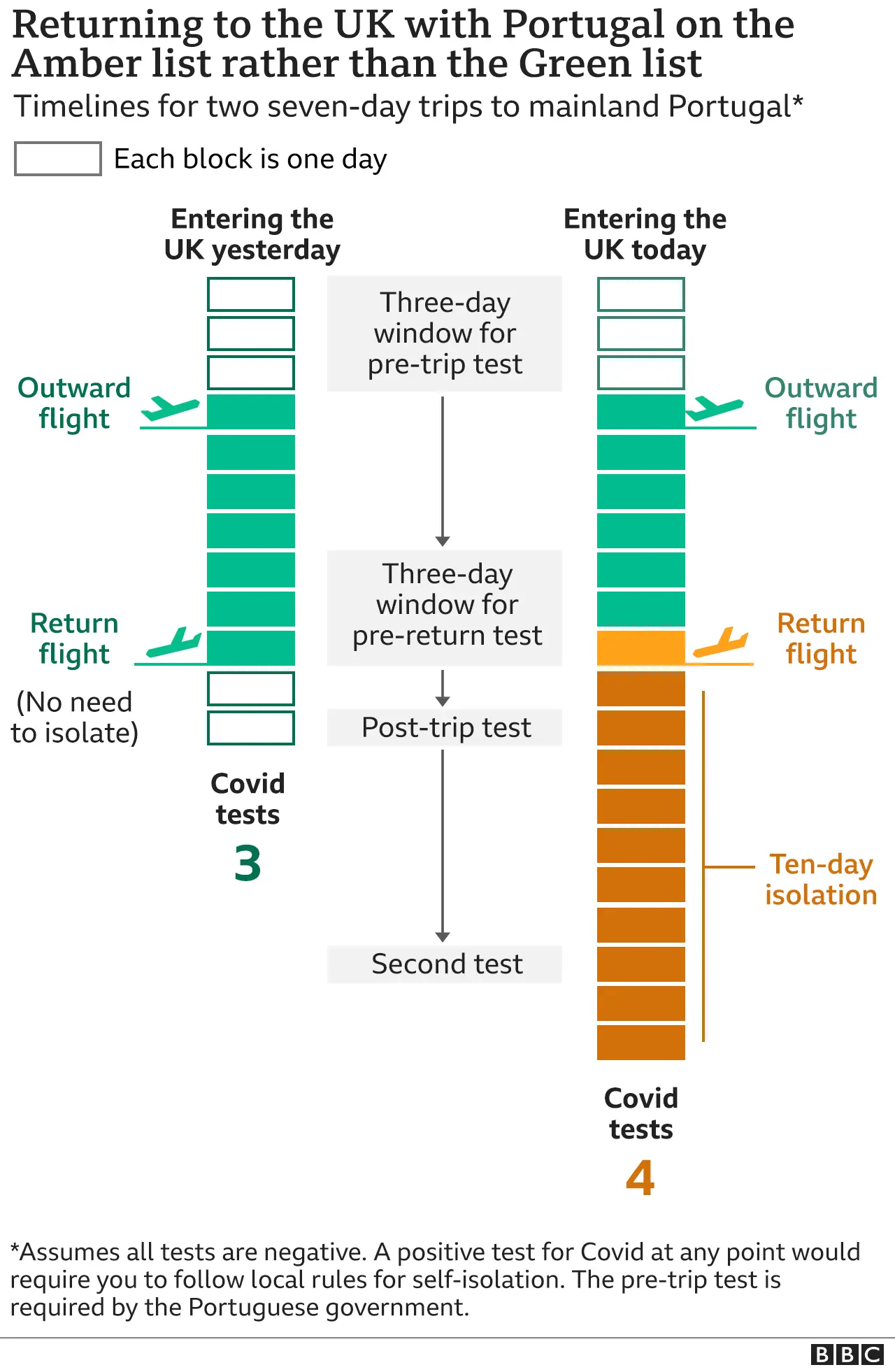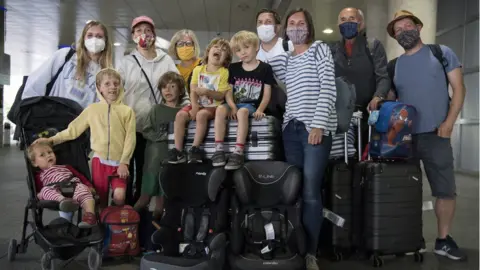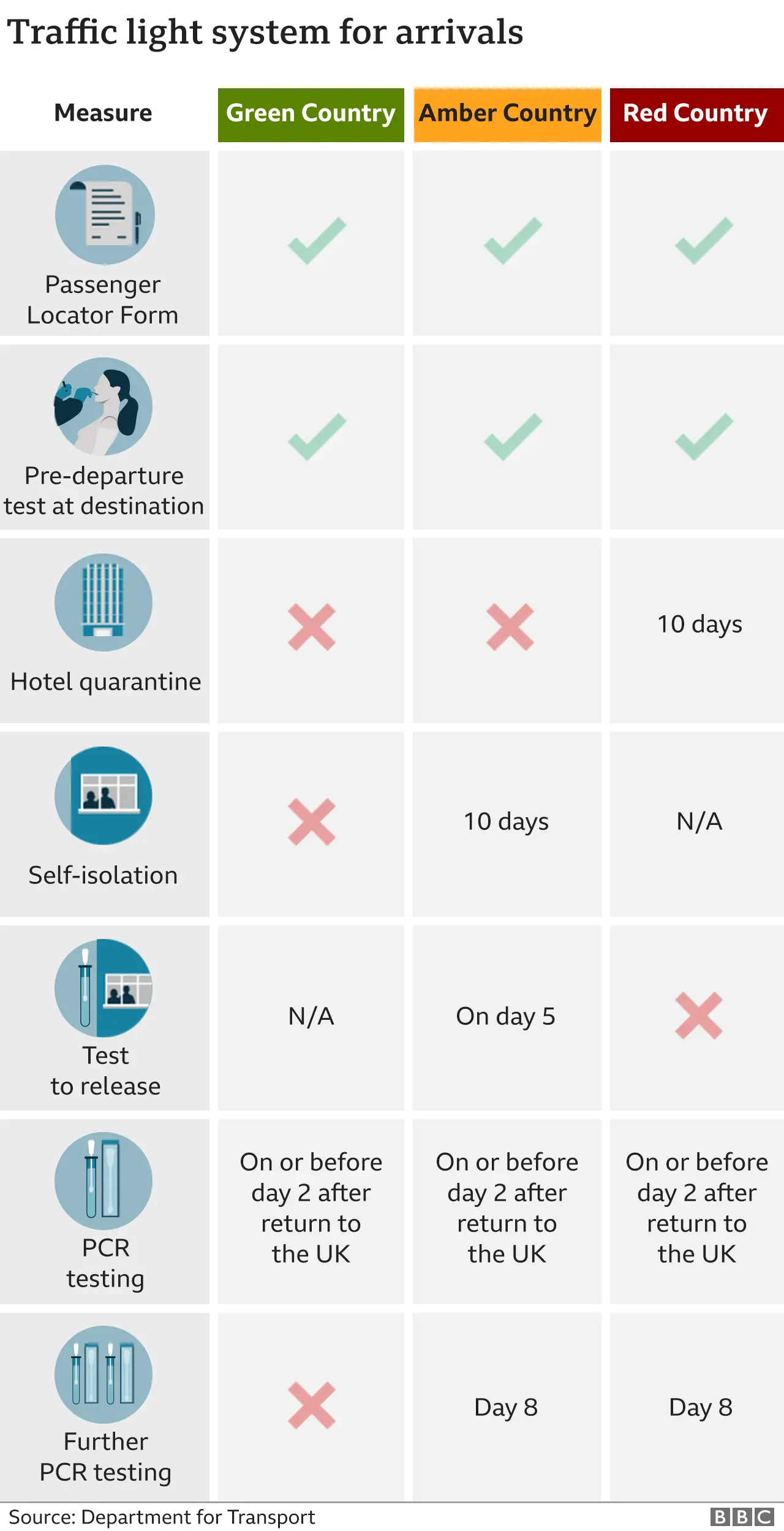Covid: Portugal joins amber list after scramble to return
British holidaymakers who dashed back from Portugal before the country came off the green travel list have spoken of their frustration, calling it an "absolute joke".
One woman said it had been a "massive inconvenience" while another couple said they had lost hundreds of pounds.
Portugal was moved to the amber list at 04:00 BST meaning arrivals must take two tests and quarantine for 10 days.
Airlines put on dozens of extra flights as people scrambled to get home.
The final commercial flight back to the UK from Portugal appeared to be a WizzAir plane from Faro to Doncaster Sheffield Airport, landing at 02:58 - little more than an hour before the deadline.
At the same time Portugal was moved to the amber list, several countries went onto the red list which requires hotel quarantine, including Afghanistan, Bahrain, Costa Rica, Egypt, Sudan, Trinidad and Tobago and Sri Lanka.
Portugal was added to the UK's green list - indicating it is safe to travel for leisure - three weeks ago on 17 May and its reversal to amber has prompted criticism from the travel industry and holidaymakers.


One woman who flew into Gatwick Airport on Monday night after cutting short her holiday said: "To put it on the green list and then to take it off three weeks later is just kind of unbelievable."
"I was part of a big group, there were 60 of us out there for a wedding... everyone's found it quite difficult."
She said it had been stressful booking new flights with just a few days' notice, adding: "It's a massive inconvenience and obviously costs everyone a lot of money."
 PA Media
PA MediaOne couple said it cost them between £700 and £800 to come back a day early so they could still go to work, but that overall the trip was "worth it" to enjoy the sunshine and seaside with their children.
The Cunningham family from Hampshire, who also arrived at Gatwick on Monday, said it was "100% ridiculous" to put Portugal on the amber list, and the government was "getting people's hopes up and dashing them down".
"Social distancing in Portugal is brilliant, everyone's wearing masks, even on the beaches," they said.


Consumer experts have also criticised how the travel list change was handled.
"Between flights selling out, expensive fares, and difficulties obtaining tests in time, it's clear the government's current approach to managing the changing situation around travel is flawed," said Rory Boland, editor of consumer magazine Which? Travel.
The head of industry body Airlines UK, Tim Alderslade, said "three months in the summer" now appeared to be the best case scenario for travel companies, and they could end up seeking further government financial support.
But Health Secretary Matt Hancock defended tough rules on travel as being necessary to protect the UK's successful vaccine rollout.
The Department for Transport (DfT) said the situation in Portugal "required swift action to protect the gains made with the vaccine rollout".
It stated that the positivity rate for coronavirus tests in Portugal had nearly doubled since the travel lists were first created four weeks earlier.
The DfT added that 68 cases of the India variant, known as the Delta variant, have been identified in Portugal.
Separate NHS Test and Trace figures showed that of 200 arrivals from Portugal tested between 6 and 19 May, three were positive for the virus.
The latest changes to travel rules leaves Gibraltar and Iceland among the countries on the shortened UK green list.

- A SIMPLE GUIDE: How do I protect myself?
- AVOIDING CONTACT: The rules on self-isolation and exercise
- WHAT WE DON'T KNOW How to understand the death toll
- LOOK-UP TOOL: Check cases in your area

It comes as 25 to 29-year-olds in England became eligible to book their first vaccine appointment.
The NHS booking system briefly crashed as people in the new age group attempted to book through the website. After showing an error message for a short while, the website resumed letting those trying to book join an online queue.
A further 5,683 cases were reported across the UK on Monday, with a single death recorded. Latest figures showed a further 127,345 people received a first vaccine dose on 6 June, with 259,941 becoming fully vaccinated.
More than 76.8% of the UK's adult population has now received a first vaccine dose, with over half (53%) having received two doses.

- LOUD AND PROUD: A playlist by Ru Paul's Drag Race finalist and icon Bimini
- HOW PERIODS AFFECT WOMEN: Why do women have periods and do we still need them?


Did you miss the deadline to avoid quarantine or have you made it back in time? Share your experiences by emailing [email protected].
Please include a contact number if you are willing to speak to a BBC journalist. You can also get in touch in the following ways:
- WhatsApp: +44 7756 165803
- Tweet: @BBC_HaveYourSay
- Upload pictures or video
- Please read our terms & conditions and privacy policy
If you are reading this page and can't see the form you will need to visit the mobile version of the BBC website to submit your question or comment or you can email us at [email protected]. Please include your name, age and location with any submission.
